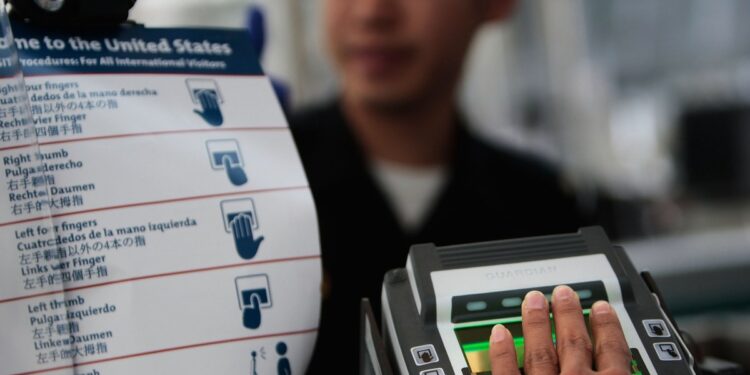[ad_1]
A U.S. safety researcher is warning of a chilling impact after he was detained on arrival at a U.S. airport, his cellphone was searched, and was ordered to testify to a grand jury, solely to have prosecutors reverse course and drop the investigation later.
On Wednesday, Sam Curry, a safety engineer at blockchain know-how firm Yuga Labs, mentioned in a series of posts on X, previously Twitter, that he was taken into secondary inspection by U.S. federal brokers on September 15 after coming back from a visit to Japan. Curry mentioned brokers with the Inner Income Service’s Legal Investigation (IRS-CI) unit and the Division of Homeland Safety questioned him at Dulles Worldwide Airport in Washington DC a few “excessive profile phishing marketing campaign,” searched his unlocked cellphone, and served him with a grand jury subpoena to testify in New York the week after.
In response to a photograph of the subpoena that Curry posted, the grand jury was investigating wire fraud and cash laundering.
However Curry mentioned he later obtained affirmation that the copy of his gadget information was deleted and the grand jury subpoena was canceled as soon as prosecutors realized that Curry was investigating the theft of crypto, and never concerned in it.
In a submit, Curry mentioned that in December 2022 he found that scammers had inadvertently uncovered their Ethereum personal key within the supply code of a phishing web site that had stolen thousands and thousands of {dollars} price of crypto. Curry mentioned he imported the important thing to his personal crypto pockets to see if there was something left within the alleged scammers’ pockets, however that he discovered the important thing “5 minutes too late and the stolen property have been gone.”
Curry mentioned he was “on my residence IP handle and clearly not making an attempt to hide my id as I used to be merely investigating this.”
“We usually take this method the place it’s seeing if there’s something we are able to do to assist. After which if we are able to’t, clearly we are able to’t. It’s tough, as a result of there are such a lot of of those phishing campaigns,” Curry advised TechCrunch in a cellphone name.
Curry mentioned that the feds had requested the authorization logs from crypto market OpenSea, which Curry used to examine the contents of the scammers’ pockets. These logs included Curry’s residence IP handle. Curry accused the feds of utilizing his arrival to the U.S. “as an excuse to ask for my gadget and summon me to a grand jury, fairly than simply e mail me or one thing.”
“I’m sharing this as a result of I believe it’s one thing individuals ought to concentrate on in the event that they’re doing related work. It was extensively shared that the personal key was leaked and my background as a safety researcher wasn’t sufficient to dissuade utilizing immigrations and a grand jury to intimidate me,” Curry mentioned in his submit.
Curry is a extensively recognized safety researcher, whose work has helped to find flaws in airline rewards programs, connected vehicles, and helped to uncover safety weaknesses at Apple, and Starbucks. Curry mentioned was flying into Washington DC to attend an election security research forum arrange by U.S. cybersecurity company CISA to audit U.S. voting machines.
After he was launched from the airport, he spoke to his lawyer, who advised the federal investigators that Curry was investigating the incident as a part of routine work as a safety researcher.
In a name, Curry advised TechCrunch he understood why the feds have been investigating the incident, however criticized their method.
“The factor I’ll give credit score for is that if in every other circumstance any person has the personal key, somebody who’s clearly carried out a multimillion greenback phishing rip-off, and use that personal key to register to OpenSea, yeah, I believe it’s a little suspicious and that’s like undoubtedly one thing to analyze,” mentioned Curry.
“They’d a manila folder with my photograph and my Twitter and all my social media, and I might have assumed that they might have regarded into it a bit of bit,” mentioned Curry. “Even only a temporary learn — simply who I’m and what I do — I really feel it could have cleared issues up loads.”
Whereas he believes the authorized demand is resolved, Curry mentioned that he “felt soiled” when the feds handed again his cellphone after looking out its contents. U.S. authorities can search an individual’s cellphone on the border and not using a warrant, together with Individuals, although the legislation is much less clear on whether or not an individual should comply. Solely U.S. residents can’t be denied entry for not complying, however they will have their gadgets seized indefinitely.
Nicholas Biase, a spokesperson for the U.S. Legal professional’s Workplace for the Southern District of New York, the place the grand jury subpoena was filed, declined to remark when reached Wednesday. Terry Lemons, a spokesperson for the IRS-CI, the prison investigative arm of the U.S. tax authority known for probing crypto thefts, didn’t return a request for remark.
It’s not extraordinary for U.S. authorities to focus on safety researchers or journalists with threats of prosecution or different kinds of authorized course of to compel testimony, like grand juries, which convene in secret to find out if formal prison fees needs to be introduced in opposition to an individual.
The connection between U.S. authorities and the safety neighborhood has largely improved lately as each attitudes in the direction of good-faith hackers and the legal landscape for safety researchers have modified for the higher. However situations like this threaten to weaken the belief constructed lately by disincentivizing researchers from participating in safety protection and remediation in the event that they suppose their actions could possibly be prosecuted.
In the previous few years, security researchers have taken matters into their own hands throughout thefts and hacking campaigns that focus on and steal cryptocurrencies. Within the crypto world, that is referred to as “white hatting,” a time period that refers back to the conventional distinction between black hats, cybercriminals or hackers who hack with malicious or unlawful intent, and white hats, researchers and hackers who function with no prison or ailing intent.
However accessing a sufferer’s pockets — even a scammer’s pockets — in an try and get better funds falls in “an actual grey space” of the legislation, former prosecutor Elizabeth Roper told Motherboard final yr.
“If it finally ends up saving everybody, each consumer on the platform and a bunch of cash and the one who did it sort of instantly discloses it,” Roper mentioned, “possibly we wouldn’t use our sources to prosecute that particular person, however once more it relies on the precise case.”
Lorenzo Franceschi-Bicchierai contributed reporting.
[ad_2]
Source link


